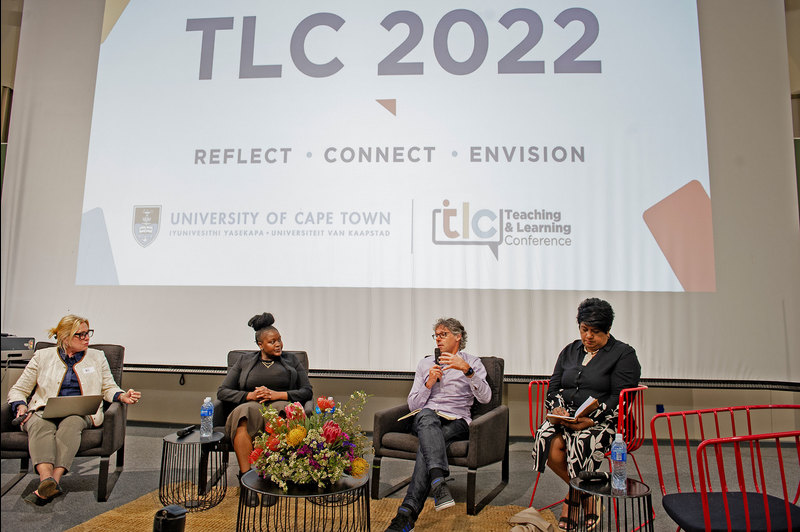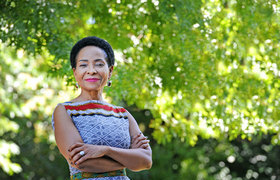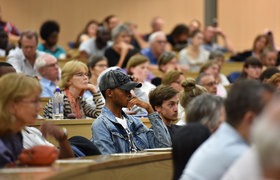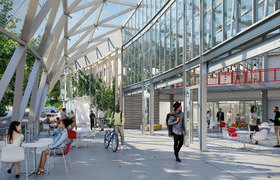TLC2022: Collaboration at the forefront of teaching and learning transformation
27 October 2022 | Story Niémah Davids. Photo Lerato Maduna. Read time 6 min.
How to collectively achieve a reframed teaching and learning experience at the University of Cape Town (UCT) from the perspective of academics and students was up for debate during a panel discussion at the 2022 Teaching and Learning Conference.
The annual event was scheduled for two days – Tuesday, 25 October and Thursday 27 October – in UCT’s Kramer Law Building on middle campus. Under the umbrella theme of “Vision 2030 and a socially just teaching and learning environment at UCT”, the conference provided UCT staff and students with an opportunity to connect, reflect and envision a socially just teaching and learning landscape
Three UCT contributors, Associate Professor Kasturi Behari-Leak, the dean of the Centre for Higher Education Development (CHED); Richard Perez, the director of the Hasso Plattner d-school Afrika; and Yanganani Sibeko, the Students’ Representative Council’s (SRC) undergraduate academics co-ordinator, weighed in on the morning dialogue. Each panellist, including the moderator, Alison Meadows, a senior lecturer in UCT’s Faculty of Commerce, contemplated several questions and provided valuable insight on the discussion topic: “A collective responsibility towards a reframed teaching and learning experience at UCT”.
One of the questions Meadows asked panellists to unpack during the session was: “What does your ideal teaching and learning experience look like?”
Create flexible environments – Perez
“I think the environments that we create need to be flexible enough to allow us to experiment with different modes of teaching.”
“I think the environments that we create need to be flexible enough to allow us to experiment with different modes of teaching, different ways of allowing students to feel a sense of belonging to education and a real connection to what they’re doing. And these spaces don’t exist at the moment.
“I think the concept of flexibility [is] allowing for teaching and learning to emerge and allowing a space for that emergence and for experimentation to happen. [It should be done] in such a way that it [leads] to critical outcomes from a graduate attribute perspective and so that everyone coming into the space feels equal and like they can contribute. All these things are components that we need to aspire to.”
Adequately prepare students – Meadows
“[At UCT] we have this very big focus on [creating] a fair and just society. So, if we want to produce graduates who themselves have come through an inclusive and supportive environment, we want those graduates to be able to change society. I do think that there is a need for us to be thinking about the kind of role we want our graduates to play.
“In the Commerce faculty we’re always thinking that we need to produce graduates who are meeting business needs, or government needs, or current needs. But what about future needs? We need to educate students to fulfil roles and take the lead in situations that we are not yet aware of. And that is the challenge.”
Embrace difference – Sibeko
“The ideal teaching and learning environment definitely incorporates the best [interest] of students and secondly that of the educators as well … It’s [an environment created] in line with UCT’s Vision 2030. The ideal space for me as a student and as a person is a space that incorporates and understands the different spheres that I [bring]. This includes my social sphere, and in terms of transformation. [The environment should seek to] understand who I am as an individual.
There’s no us and them – Behari-Leak
“There is no formula or recipe for the best. It doesn’t exist and I think the working progress and aspiring and being inspired to get closer to the truth is an ongoing challenge we should embrace. For me the critical question is: What must the condition be like for us to say we’d like a space that makes us feel included and that we belong? If you just scratch under the surface, you’ve got to ask: What is it that we’ve created that makes staff and students feel that they don’t belong and that they’re not included? Why is it that in this day and age we call for a humanising pedagogy, which has to do with minimising risk and feeling included? Why is it that as human beings we have to make this call?
“The best we can do is to create conditions for those optimal principles to be enacted and embodied.”
“In answering the question, I think that often we think about the university as being something out there. But I think with all of us in this space and the students in our classrooms we have society in here. There’s no us and them really. All the issues that surface are in fact issues that we work with daily. The university and the life that we want to create for the students who are shaped [here] and go back into society, should be exactly the kind of values and principles we have here. The best we can do is to create the conditions for those optimal principles to be enacted and embodied. It then begs the question: What is it that we hold dear and have we been explicit about that?”
 This work is licensed under a Creative Commons Attribution-NoDerivatives 4.0 International License.
This work is licensed under a Creative Commons Attribution-NoDerivatives 4.0 International License.
Please view the republishing articles page for more information.










